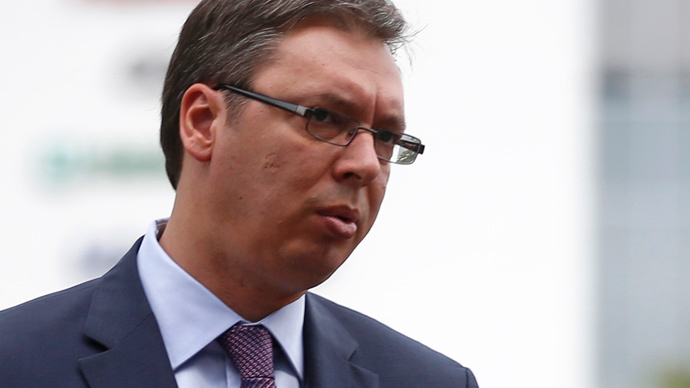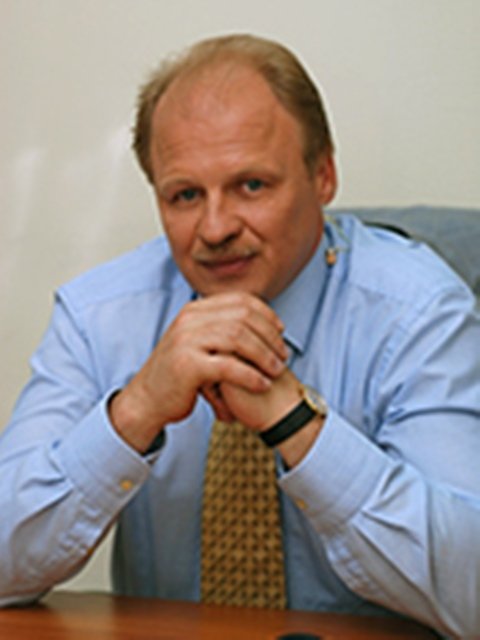Serbian PM’s US trip: Drifting away from Russia?

Belgrade insists that the Serbian prime minister’s visit to Washington, complete with gas-related discussions, would strengthen cooperation with the US and not distance Serbia from Russia. Should Moscow be concerned?
Originally, Serbian Prime Minister PM Aleksandar Vučić was planning to visit the US in autumn this year. But something came up - specifically a refusal by Serbian President Tomislav Nikolić to obey Washington’s orders and extend anti-Russian sanctions to Russia’s Victory Day celebrations on the 70th anniversary of the victory over fascism.
Literally hours after Nikolić announced his intention to attend the VE parade in Moscow, Europe began sending signals to Washington regarding Russia’s efforts to ‘Putinize’ Serbia by exerting undue pressure on Belgrade.
READ MORE: Serbia to join US-backed gas project, seeks diversification from Russia - PM
Washington saw this as a sign of deepening Russian and Serbian relations, which, from their point of view, was a worrying tendency. So they called on the young prime minister to expedite his visit to Washington to report on what was behind Nikolić’s symbolic gesture, and give guarantees that the historic cultural link that still bonds Russia-Serbia relations will amount to nothing aside from some context for Belgrade’s drift towards Euro-integration.
Vučić had to prove, of course, that Washington made the right choice in naming him their “best boy” on the Balkans. So, he made the only move that would be easily understood by the Yanks and frustrate the Russians: in an interview with the Associated Press before his visit, Vučić said that Serbia intends to participate in the US pipeline that will deliver gas to Europe from Azerbaijan, rather than participate in a new project that will bring Russian gas to the Balkans through Turkey.
"We are willing to diversify the sources of gas for Serbia, which is also very important for our American friends," Vučić said.
For people who have been following international politics for quite a long time, this confession may have sounded strange, and more so for Russians, but not for me.
I have been reporting from different parts of former Yugoslavia since the tragedy of the Bosnian city of Mostar, much of which was razed to the ground in 1993. But the most instructive experience was my assignment to Kosovo six years later. We arrived in Belgrade just in time to witness the impact of NATO airstrikes against Yugoslavia, launched in retaliation for Serbia’s refusal to sign a Kosovo peace plan. NATO flew over 35,000 combat missions over Yugoslavia.
“More than 20,000 laser or satellite-guided weapons were launched and over 79,000 tons of explosives dropped, including 152 containers with 35,450 cluster bombs, thermo-visual and graphite weapons, which are prohibited under international conventions,” the International Action Center reported.
Later, NATO admitted the bombing of civilian targets, justifying it as either "mistakes" or essential to the destruction of the Yugoslav Army. From March 24 to June 11, 1999 at least 1,000 civilians were killed, over 800 have been reported missing and more than 6,000 sustained serious injuries. Many thousands of Yugoslavian “children have been victims of the sprinkle cluster bombs, with delayed effects, and continued to be victimized until all parks, play[ing] fields and open areas have been made safe from the remaining unexploded bombs scattered throughout Yugoslavia,” IAC said. This is not to mention warheads with depleted uranium also tested by NATO on the Serbs. In those less than three months, the UNHCR reported 400,000 refugees.
READ MORE: Serbia wants to join Turkish Stream – foreign minister
Finally, in the aftermath of the Kosovo War, a column of about 30 Russian armored vehicles carrying 250 Russian troops, who were part of the international peacekeeping force in Bosnia, moved into Serbia and on June 12, 1999 the Russians occupied Pristina International Airport ahead of a NATO deployment.
The move was part of a sincere effort to save the Serbs massacred by the hundreds in Kosovo, and it caused a tense stand-off between the NATO contingent and Russian forces over the airport. It was resolved peacefully, although Moscow had to make serious concessions in return for its sympathy to the Serbs. The Russian officers, deployed in Pristina for another four years, would rather take me to dinner at Albanian inns.
“Why ignore our Serbian brothers?” I asked.
“Wait until you get to know them better,” came the response.
When did this idea of Serbian and Russian brotherhood appear? The two countries share the Orthodox faith and a common Slavic culture which has made them traditional allies for ages, and this cultural bond still holds them together. However, examining centuries of Russian and Serbian relations, and especially their ties over the last hundred years, demonstrates the instrumental nature of their relations rather than any primitive cultural compassion.
Leading up to and during the two World Wars, Russia served as the guardian of Serbian independence and autonomy. However, while the rhetoric of pan-Slavism may have been used, what Russia was really interested in was strengthening the security of its own borders and preserving the balance of power between the empires, which could be upset with Serbia’s reduced position in Europe. By the way, in peaceful times, between the wars and during the Cold War, relations between Yugoslavia and the USSR were rather tepid. They did cooperate on some issues, but with Belgrade remaining nonaligned. As a matter of fact, even for Soviet tourists heading abroad, Yugoslavia was considered a “capitalist” country.
READ MORE: Gazprom, Ankara agree to start Turkish Stream gas deliveries in Dec 2016
In the 1990s, after the breakup of both the Soviet Union and the Yugoslavian Federation, the idea of Russian and Serbian natural ties resurfaced. In the 1999 crisis, Russia – diplomatically and even militarily – tried to protect Serbia from US and NATO action in Bosnia-Herzegovina and Kosovo. But these days it is presented to the world as part of Moscow’s nationalist narrative, which is now used to justify Serbia turning its back on the Kremlin in the current crisis.
In the wake of Putin’s reaction to the dramatic events in Ukraine, discussions of the dangerous revival of Russian nationalism and the Russian Orthodox Church have come into vogue. Russia’s effort to return to its historically earned place in Europe is now considered nothing less than the revival of the Russian Empire. Nobody seemed to care that in reality Russia’s geopolitical ambitions weren’t leading Putin to influence Serbia, much as it was the case historically. For more than a year, Brussels, by means of the media and politicians, have been trying to persuade Serbia to join the US-initiated sanctions against Russia. Belgrade’s hesitation to take sides in the conflict on the issue of Ukraine, however, didn’t look good from the West.
But a recent trend in Serbia’s working relationship with both
Russia and the EU indicates that it views modern political
intercourse in instrumental rather than ethical terms. In the
wake of the Victory Parade in Red Square, the South Stream
pipeline debacle, Putin’s visit to Belgrade, and increasing calls
for Serbia to support a side in Ukraine, it appears that Serbia
is continuing its own tradition of attempting to stand between
the East and the West, and between great powers.
Serbia seeks to capitalize on all opportunities by simply not
working against either Russia or the EU. Serbia initially refused
to join the Western sanctions against Russia, but then refused to
participate in the Russian pipeline project in Southern Europe.
Belgrade has openly stated that good relations with Washington
are important for Serbia as their path to the EU.
Yes, Russia and Serbia have an ancient fondness for each other, and their cultural similarities drive each state toward friendly relations. But examining Russia-Serbia relations in an instrumental light will lead to fewer misguided attempts to build foreign policy on historical misconceptions. Russia-Serbia relations could be problematic for the EU-oriented future of Serbia. But it’s Serbia’s own people who will determine their choice, rather than any predestined cultural teleology pushing Belgrade toward Brussels.
The statements, views and opinions expressed in this column are solely those of the author and do not necessarily represent those of RT.
The statements, views and opinions expressed in this column are solely those of the author and do not necessarily represent those of RT.













